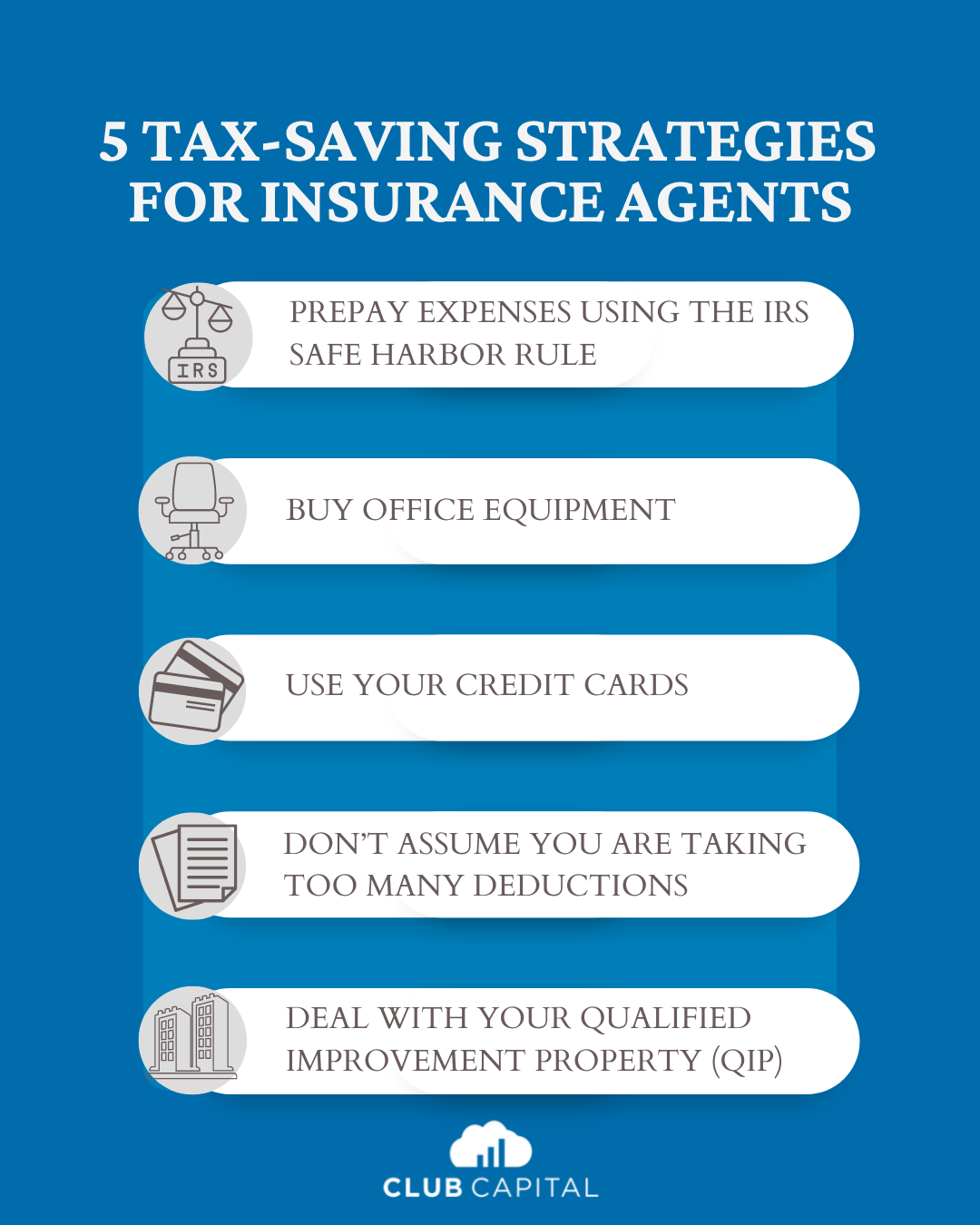It's almost December, and that means it's time to start thinking about year-end tax planning. It can be overwhelming, but don't worry – we've got you covered.
As an insurance agency owner, there are some things you can do now to make sure you get the biggest tax deduction possible. Here are five of our top tax-saving strategies.

Top 5 Year-End Tax Tips For Insurance Agents
With the end of 2022 just around the corner, it's time to start planning for next year. Here are five powerful business tax deduction strategies you can easily understand and implement before the end of 2022.
1. Prepay Expenses Using the IRS Safe Harbor Rule
Did you know the IRS has a tax-deduction safe harbor rule that allows you to prepay and deduct your expenses up to 12 months in advance without challenge, adjustment, or change from the IRS. This means that your 2022 prepayments cannot go into 2023.
For a cash-basis taxpayer, qualifying expenses under this safe harbor include:
- lease payments on business vehicles
- rent payments on offices and machinery
- business and malpractice insurance premiums
How it works: You pay $3,000 a month in rent and would like a $36,000 deduction this year. So on Friday, December 30, 2022, you mail a rent check for $36,000 to cover all of your 2023 rent. Your landlord does not receive the payment in the mail until Tuesday, January 3, 2023. Here are the results:
- You deduct $36,000 in 2022 (the year you paid the money).
- The landlord reports taxable income of $36,000 in 2023 (the year he received the money).
Outcome:
- You get what you want – the deduction this year.
- The landlord gets what he wants – next year’s entire rent in advance, eliminating any collection problems while keeping the rent taxable in the year he expects it to be taxable.
2. Buy Office Equipment
If you're looking to buy equipment or machinery, now's the time to do it.
With bonus depreciation at 100 percent along with increased limits for Section 179 expensing, buy your equipment or machinery, place it in service before December 31, and get a deduction for 100 percent of the cost in 2022.
Qualifying bonus depreciation and Section 179 purchases include new and used personal property such as:
- Machinery
- Equipment
- Computers
- Desks, chairs, and other furniture
- and certain qualifying vehicles
Get ready to take advantage of these opportunities!
3. Use Your Credit Cards
If you're a sole proprietor or single-member LLC filing Schedule C for your business, the day you charge a purchase to your business or personal credit card is the day you deduct the expense. This means that as a Schedule C taxpayer, you should consider using your credit card for last-minute purchases of office supplies and other business necessities.
Recommended Reading: How Sole Proprietorships Are Taxed: Ultimate Guide
If you operate your business as a corporation, and if the corporation has a credit card in the corporate name, the same rule applies: The date of charge is the date of deduction for the corporation.
But what if you operate your business as a corporation and are also the personal owner of that credit card? In that case, the corporation must reimburse you if you want the corporation to realize the tax deduction, which happens on the reimbursement date. So submit your expense report and have your corporation make its reimbursements to you before midnight on December 31.
4. Don’t Assume You Are Taking Too Many Deductions
If your business deductions exceed your business income, you have a tax loss for the year. With a few modifications to the loss, tax law calls this a “net operating loss,” or NOL.
If you are starting your business, you could very possibly have an NOL. You could have a loss year even with an ongoing successful business.
You used to be able to carry back your NOL for two years and get immediate tax refunds from prior years, but the Tax Cuts and Jobs Act (TCJA) eliminated this provision. Now you can only carry your NOL forward, and it can only offset up to 80 percent of your taxable income in any one future year.
So, what does this all mean? Never stop documenting your deductions, and always claim all your rightful deductions. We have spoken with far too many business owners, especially new owners, who don’t claim all their deductions when those deductions would produce a tax loss.
5. Deal with Your Qualified Improvement Property (QIP)
In the CARES Act, Congress finally fixed the qualified improvement property (QIP) error that it made when enacting the Tax Cuts and Jobs Act (TCJA).
QIP is any improvement made by you to the interior portion of a building you own that is nonresidential real property – think office buildings, retail stores, and shopping centers – if you place the improvement in service after the date you place the building in service.
Why it matters: QIP is not real property that you depreciate over 39 years. QIP is 15-year property, eligible for immediate deduction using either 100 percent bonus depreciation or Section 179 expensing. To get the QIP deduction in 2022, you must place the QIP in service on or before December 31, 2022.
Tax tip: If you have QIP property on an already filed 2019 return that you did not amend, it’s on that return as 39-year property. You need to fix that and will likely add some cash to your bank account by making the fix.
Club Capital Is Here To Help
For the past 5 years, Club Capital has helped insurance agents better manage their agency's finances through best-in-class monthly accounting, CFO, and tax services. Schedule a demo today!


Comments